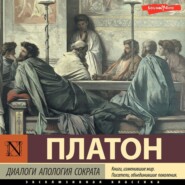По всем вопросам обращайтесь на: info@litportal.ru
(©) 2003-2024.
✖
Euthydemus
Настройки чтения
Размер шрифта
Высота строк
Поля
And you say that gentlemen speak of things as they are?
Yes.
Then the good speak evil of evil things, if they speak of them as they are?
Yes, indeed, he said; and they speak evil of evil men. And if I may give you a piece of advice, you had better take care that they do not speak evil of you, since I can tell you that the good speak evil of the evil.
And do they speak great things of the great, rejoined Euthydemus, and warm things of the warm?
To be sure they do, said Ctesippus; and they speak coldly of the insipid and cold dialectician.
You are abusive, Ctesippus, said Dionysodorus, you are abusive!
Indeed, I am not, Dionysodorus, he replied; for I love you and am giving you friendly advice, and, if I could, would persuade you not like a boor to say in my presence that I desire my beloved, whom I value above all men, to perish.
I saw that they were getting exasperated with one another, so I made a joke with him and said: O Ctesippus, I think that we must allow the strangers to use language in their own way, and not quarrel with them about words, but be thankful for what they give us. If they know how to destroy men in such a way as to make good and sensible men out of bad and foolish ones – whether this is a discovery of their own, or whether they have learned from some one else this new sort of death and destruction which enables them to get rid of a bad man and turn him into a good one – if they know this (and they do know this – at any rate they said just now that this was the secret of their newly-discovered art) – let them, in their phraseology, destroy the youth and make him wise, and all of us with him. But if you young men do not like to trust yourselves with them, then fiat experimentum in corpore senis; I will be the Carian on whom they shall operate. And here I offer my old person to Dionysodorus; he may put me into the pot, like Medea the Colchian, kill me, boil me, if he will only make me good.
Ctesippus said: And I, Socrates, am ready to commit myself to the strangers; they may skin me alive, if they please (and I am pretty well skinned by them already), if only my skin is made at last, not like that of Marsyas, into a leathern bottle, but into a piece of virtue. And here is Dionysodorus fancying that I am angry with him, when really I am not angry at all; I do but contradict him when I think that he is speaking improperly to me: and you must not confound abuse and contradiction, O illustrious Dionysodorus; for they are quite different things.
Contradiction! said Dionysodorus; why, there never was such a thing.
Certainly there is, he replied; there can be no question of that. Do you, Dionysodorus, maintain that there is not?
You will never prove to me, he said, that you have heard any one contradicting any one else.
Indeed, said Ctesippus; then now you may hear me contradicting Dionysodorus.
Are you prepared to make that good?
Certainly, he said.
Well, have not all things words expressive of them?
Yes.
Of their existence or of their non-existence?
Of their existence.
Yes, Ctesippus, and we just now proved, as you may remember, that no man could affirm a negative; for no one could affirm that which is not.
And what does that signify? said Ctesippus; you and I may contradict all the same for that.
But can we contradict one another, said Dionysodorus, when both of us are describing the same thing? Then we must surely be speaking the same thing?
He assented.
Or when neither of us is speaking of the same thing? For then neither of us says a word about the thing at all?
He granted that proposition also.
But when I describe something and you describe another thing, or I say something and you say nothing – is there any contradiction? How can he who speaks contradict him who speaks not?
Here Ctesippus was silent; and I in my astonishment said: What do you mean, Dionysodorus? I have often heard, and have been amazed to hear, this thesis of yours, which is maintained and employed by the disciples of Protagoras, and others before them, and which to me appears to be quite wonderful, and suicidal as well as destructive, and I think that I am most likely to hear the truth about it from you. The dictum is that there is no such thing as falsehood; a man must either say what is true or say nothing. Is not that your position?
He assented.
But if he cannot speak falsely, may he not think falsely?
No, he cannot, he said.
Then there is no such thing as false opinion?
No, he said.
Then there is no such thing as ignorance, or men who are ignorant; for is not ignorance, if there be such a thing, a mistake of fact?
Certainly, he said.
And that is impossible?
Impossible, he replied.
Are you saying this as a paradox, Dionysodorus; or do you seriously maintain no man to be ignorant?
Refute me, he said.
But how can I refute you, if, as you say, to tell a falsehood is impossible?
Very true, said Euthydemus.
Neither did I tell you just now to refute me, said Dionysodorus; for how can I tell you to do that which is not?
O Euthydemus, I said, I have but a dull conception of these subtleties and excellent devices of wisdom; I am afraid that I hardly understand them, and you must forgive me therefore if I ask a very stupid question: if there be no falsehood or false opinion or ignorance, there can be no such thing as erroneous action, for a man cannot fail of acting as he is acting – that is what you mean?
Yes, he replied.
And now, I said, I will ask my stupid question: If there is no such thing as error in deed, word, or thought, then what, in the name of goodness, do you come hither to teach? And were you not just now saying that you could teach virtue best of all men, to any one who was willing to learn?
And are you such an old fool, Socrates, rejoined Dionysodorus, that you bring up now what I said at first – and if I had said anything last year, I suppose that you would bring that up too – but are non-plussed at the words which I have just uttered?
Why, I said, they are not easy to answer; for they are the words of wise men: and indeed I know not what to make of this word 'nonplussed,' which you used last: what do you mean by it, Dionysodorus? You must mean that I cannot refute your argument. Tell me if the words have any other sense.
No, he replied, they mean what you say. And now answer.
What, before you, Dionysodorus? I said.
Answer, said he.

















